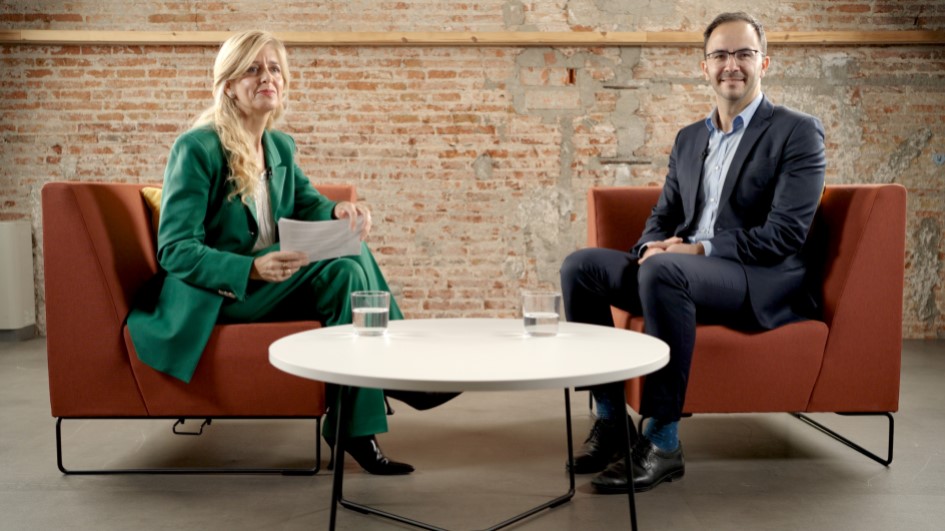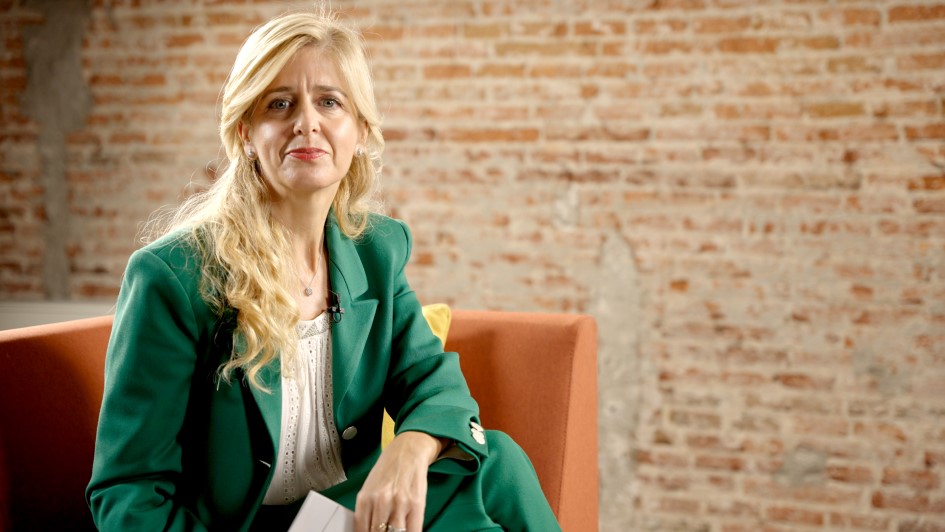We use first and third-party cookies for analytical and statistical purposes and to show you personalised advertisements based on a profile compiled from your browsing habits (e.g. pages visited). For more information, click on our Cookie Policy. You can accept all cookies by pressing 'Accept', you can reject all cookies by pressing 'Reject', or you can customize your choice by pressing 'Manage'.

European funds in 2023: the year of opportunities for companies.
NextGen funds are entering a crucial year and there is no time to lose if we are to take advantage of the launching of several pending calls, of the second rounds that will opening in the coming months, and of the new PERTEs directed at Spanish industry.
Emma Montserrat, European Union Fund Manager and Deputy Assistant Managing Director at Bankinter, talks in this interview with Gerard Brinquis, strategy & grants director and director of European Funds at FI Group, about the developments in Next Generation funds for 2023.

Emma Montserrat: We are already in the third year since the arrival of the European NextGen funds and it seems that 2023 comes with important news for companies. Can you clarify the situation for us?
Gerard Brinquis:
I would group the new developments into three main categories. First of all, let's talk about the PERTEs. We have seen the definitive resolution of the electric vehicle PERTE in its first edition, which allows us to learn about how the other PERTEs will develop. Like the decarbonisation PERTE, which was approved at the end of 2022 with a public endowment of 3.1 billion euros.
The most relevant development has been the modification and relaxation of the regulations governing the agri-food and naval PERTE, which is already open, in terms of endorsements and guarantees. It was one of the most important limitations in financing and its relaxation is the result of the lessons learned from the PERTE for electric vehicles.
Secondly, we have seen a relevant change in European regulations regarding these funds, derived from the Ukrainian war. The new time frame in state aid also extends the funding limits. Regulation 651, the state aid block exemption regulation, which also applies to NextGen funds, is being considered as a boost to the recovery plan.
An addendum to the plan has already been approved by the Council of Ministers. We are talking about 90 billion euros in funds additional to those we had for the period 2021-2023 and which are broken down largely into loans. There are 7.7 billion euros in direct transfers and 84 billion euros in the form of loans that will reinforce the 12 PERTE.
Emma Montserrat: Time has passed and it is time to do a retrospective. Where do we come from and what has happened in these first steps taken regarding European funds?
Gerard Brinquis:
Spain has managed to be the country that has most improved towards the milestones set by the European Commission. We have already achieved three milestones, two of which have each resulted in a direct transfer to Spain of 10 billion and 12 billion euros. And in November, an additional 6 billion euros were requested as a third transfer.
We are coming from a very turbulent end of 2020 and beginning of 2021 with the elaboration of the recovery plan and the manifestations of interest. It all generated expectations that later in 2021 were not met because the calls did not arrive. In 2021, we saw a bit of a break, a slowdown in the publication of calls. But in 2022 we have seen a remarkable acceleration and an explosion in the publications of the first calls and the first PERTE. The main milestone of 2022 has been the publication of the PERTE for electric vehicles. It is the first PERTE to be published that resolves the channelling of funds.
Emma Montserrat: What do you think we should pay more attention to in the coming months?
Gerard Brinquis:
We should think in the short term, about near-sight opportunities, but also in the medium and long term, because we are at the beginning of the year and there is an opportunity for a competitive advantage in planning the fundraising strategy for the year.
In terms of the short term, there are the agri-food PERTE and the naval PERTE, which have already launched and will be closing in February. They include improvements, such as more flexibility with respect to the regulations applied in the electric vehicle PERTE. So, we already have two great opportunities very close at hand.
And in terms of annual planning, we must take into account the mechanisms and tools that we had in 2021 and 2022 -- in 2023 they will be expanded along three main axes: firstly, the historical calls for proposals, we already know them and know that their budgets have been increased (their endowments are larger and more projects can be accommodated) and, secondly, the new calls, with the advantage that we have already tested many of them in 2022, and we will be seeing second rounds of calls that we already know. Finally, we should keep and eye on how all the PERTEs and lessons learned from the electric vehicle PERTE are applied and develop.
One of the developments we are very attentive to is the RepowerEU plan, which should help all member countries in saving energy, in the production of clean energy and in energy diversification.
Emma Montserrat: Time is ticking and there are already opportunities on the table. What are the calls that we cannot miss in 2023?
Gerard Brinquis:
It's hard to say, it's a good question. As you say, Emma, the challenge for companies is to identify those opportunities. If I had to identify any opportunities that will appear in the first quarter, I would look at three areas. First, the digital sector, which is going to be very strong, with great initiatives towards digitisation and incorporating 5G technology. Secondly, I would point to the energy sector. We expect a big call regarding hydrogen valleys, as well as replicas of calls that worked very well during 2022, such as those for pioneering and unique projects, and for projects contributing to value chains. There is still a very strong commitment to hydrogen.
As for R+D+i, it has been a vital pillar of the recovery plan. We must not lose sight of public-private collaboration programmes, in particular of the missions of the centre for the development of industrial technology (CDTI). And there is a third area, that of the strategic projects for economic recovery and transformation (PERTE). We have already launched the first PERTE, focused on a first edition of electric vehicles, but we know that during 2023 the naval and agri-food sectors will be launching their own projects. And we will be seeing the first steps taken by the PERTE for semiconductors, and those of the PERTE for industrial decarbonisation, as well as the developments in the PERTE for electric vehicles, as it progresses through its second stage.
Emma Montserrat: Companies know that they cannot face these calls alone, without support. Why is it essential to have specialised advice in order to optimally access NextGen funds?
Gerard Brinquis:
The reason for having a strategic partner is essential, especially given the global advice they can offer you. Whether it be a public or private entity. We must understand that the life cycle of any project to be presented starts from the identification of the company's challenge to the case for potential support as a beneficiary. At FI Group we are more than 720 consultants nationwide. Our mission is comprehensive advice on financing. We are very focused on helping organisations understand how the funds work in order to make them as accessible to them as possible. We want to become facilitators of the funds.
Emma Montserrat: Experience shows that it is not easy to apply for calls. Resolutions are not always positive, as was the case in the PERTE for electric vehicles. How do you support the companies from FI Group along the process?
Gerard Brinquis:
The most important thing to do is to inform. Timely and accurate reporting is very important to manage the generation of expectations, so that companies understand how these funds are channelled. Secondly, also very important, is evangelisation. In other words, help companies wishing to participate understand the rules of the game and the framework of action. But, finally, I believe the differential value lies in global and integral support. Companies are confident that you will respond. We support companies from the initial identification of their challenge, its problems and needs, all the way to the application process, follow-up and evaluation.
These are long time frames. Without foresight, it is very difficult to benefit from this type of funds.. Companies in many cases do not know how to start, how to take the first steps. By covering these three layers, we try to anticipate the possible arrival of a call and adjust it to a company's project.
Emma Montserrat: A further complexity of the funds is that the calls are launched from the autonomous communities. What opportunities do you see at the regional level?
Gerard Brinquis:
The autonomous communities are very important in the recovery plan. As conduits of funds, with the budget items allocated to them, and as catalysts of funds and projects, because they revitalise their entire regional fabric to have to access funds, whether regional or national.
We see different strategies according to each autonomous community. Keeping with the rules of the game, each one has a particular type of project that it wants to promote. For instance, Catalonia has recently opened a call for reindustrialisation and localisation of new productive activities. In the Basque Country, which has a large industrial fabric and a long history in the management of European funds, we are seeing a boost in the field of decarbonisation and digitisation, in industry 4.0 and in R+D+i. Two more examples: Andalusia and Valencia are betting on localisation, energy efficiency, training and research projects.
Emma Montserrat: We already know the transversal axes of the plan: sustainability and digitisation. But which are the sectors that benefit most from European funds?
Gerard Brinquis:
There are sectors that have always been in the spotlight and are mentioned more than once, such as the automotive industry and sustainable mobility. But there are other sectors that have been verticalised by the different PERTE: semiconductor, agri-food, shipbuilding, aerospace and pharmaceutical industries, with a strong focus on public-private collaboration, in order to transfer the knowledge generated in universities, hospitals and research centres to companies. It is also the case of the electro-intensive and heavy industry. The decarbonisation PERTE is very much focused on industrial plants that are highly energy-dependent.

At Bankinter we are prepared to join companies on this journey, hand in hand with the FI Group.

